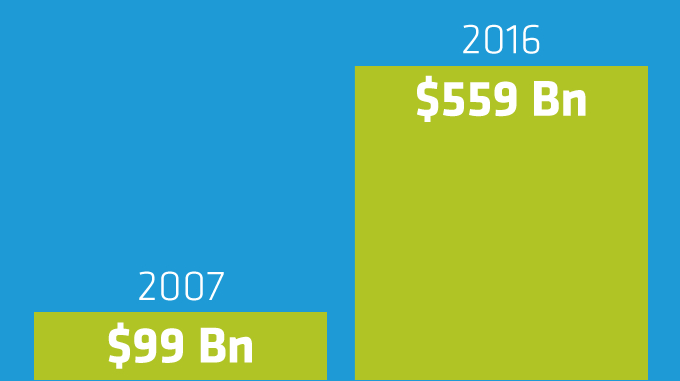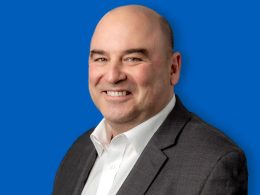by Scott Krisiloff, Avondale Asset Management
Each week we read dozens of transcripts from earnings calls and presentations as part of our investment process. Below is a weekly post which contains some of the most important quotes about the economy and industry trends from those transcripts. Click here to receive these posts weekly via email.
Optimism is running high and animal spirits are real, but economic activity hasn’t caught up quite yet. Still, businesses are making plans to invest and spending can’t be far behind. Corporate America is positive on Trump. Is that positivity enough to spark inflation?
The Macro Outlook:
The animal spirits are real
“the animal spirits are real, there is no doubt about it…when you have the whole herds thinking about slow global growth and that’s just the way it is and that’s just the way it’s going to work, well, it becomes self-reinforcing because we all act that way…but right now the feelings are better than I’ve seen them in long time and that could be enough to get the herd moving in the direction of saying, I’d better not miss this moment as oppose to just hunker down and keep waiting it out.” —Honeywell CEO Dave Cote (Conglomerate)
There’s a lot to be optimistic about, but activity hasn’t picked up quite yet
“client sentiment has clearly and markedly improved. With that said when you look at their actual activity levels…There is a little sense of urgency…they are waiting to see more activity in their business before their hiring activity reflects that…I think that the good news is the optimism is up as they start seeing more activity and so forth among their own clients, I think their hiring levels will pick up…so if you want to be an optimist there is a lot to be optimistic about.” —Robert Half CEO Harold Messmer (Temp Staffing)
We’ve moved from sparks to smoke
“I think the best way to sum it up, too, I was talking to one of our key partners in oil and gas, and he said, Lee, 60, 90 days ago, I would have said we see sparks, and today I am starting to see smoke. And so there is just things happening out there, which are positive.” —Parker Hannifin CEO Tom Williams (Industrial Components)
Companies continue to try to see the best in Trump
“And you know in spite of the headlines, and there’s been quite a few, President Trump is really not against trade agreements. Now, he’s made it very clear he wants trade agreements to be fair from a U.S. perspective. And he also has made it clear that versus multilateral agreements, that he’s much more focused on bilateral agreements.” —UPS CEO David Abney (Logistics)
“I do believe like everybody else that in the corporate world, there are a lot of us have built our business on the freer flow of cross-border trade, data and people. If that were to change over time, that would be a problem, but I don’t believe that that’s what the administration wants to do. They want to grow the economy.” —Mastercard CEO Ajay Banga (Payments)
A lot of companies are saying that a border adjusted tax wouldn’t have much effect on them
“Without knowing the exact policy changes, if the policy that came in was something along the lines of a border adjustment tax, we believe the impact on us would not be significant, since we are balanced if you total up our imports. And we’ve recently been looking in some detail at this just to make sure we fully understand the numbers.” —Eaton CEO Richard Fearon (Industrial Components)
“We’re a net exporter, so on balance it would benefit us from a tax standpoint.” —Honeywell CEO Dave Cote (Conglomerate)
Inflation probably isn’t far off
Inventories are lean
“No, I would not characterize the channel as inventory heavy at all. And you know some [distributors] that were tied to oil and gas did get stuck with some inventory. I would say, by and large, that’s not 100% gone, but it’s burned off quite a bit. So I don’t consider the channel heavy at all.” —Parker Hannifin CFO Lee Banks (Industrial Components)
The US job market continues to tighten
“All indications are that the U.S. job market continues to tighten. Unemployment for college -degreed workers 25 years and older is just 2.5% today. This is placing pressure on the labor supply, particularly at higher skill levels.” —Robert Half CEO Harold Messmer (Temp Staffing)
Commodity costs have gone up
“we think, today there is a lot of speculation built into the expectations of global growth, and hence the demand for commodities or the price of commodities have really been fluctuating quite significantly…really it’s almost across the board where we’ve seen commodity inflation creep into the system…for the most part, we’ve seen most of our commodity input costs go up over the last 90 days or so.” —Eaton CFO Craig Arnold (Industrial Components)
International:
The Indian government launched a transformative demonetization program in November
“In India, the government has recently implemented a plan to address its parallel economy and to help drive the shift from cash to electronic forms of payment. Given the heavy reliance on cash in that economy, this is expected to soften consumer spending in the short term, but could well fuel economic growth and modernize the payment system in the long term…When the demonetization happened, the two biggest currency notes were taken out of circulation, the INR 500 and the INR 1,000 notes constituted 86% of the currency notes in circulation…I think the Prime Minister is to be credited for his willingness to take it on, because in the medium to long term, this could be transformative for the way India’s economy operates in the recognizable formal economy, as compared to the informal economy, where it’s denied taxation and denied credit and denied insurance. I think he’s really trying to do something pretty brave here.” —Mastercard CEO Ajay Banga (Payments)
It sounds like Brazil’s economy may not be improving
“In Brazil, rising unemployment and reduced consumer confidence meant that the contraction of consumer spending power and down-trading accelerated through the second half of the year. In fact, in the fourth quarter, market volumes declined by almost 10%.” —Unilever CFO Graeme Pitkethly (Packaged Goods)
France’s economy may not be too healthy either
“Well clearly, France category is turning negative was not a pleasant or expected event. I think there is public information out there that says that some retailers in France have suffered from the same problem which is to say consumer purchasing weakness in France. So, you’re certainly seeing deflation in France and indeed in some categories, volume reduction” —Colgate Palmolive CEO Ian Cook (Packaged Goods)
Financials:
Repatriation could lead to more M&A
“If a lot more cash comes back in, you could see more M&A from larger corporations as they now are flush with a lot of liquidity and now they’re going to be willing to put that for growth, that’s clearly a possibility.” —SVB Financial CEO Greg Becker (Bank)
“I am optimistic given what I’m hearing that there would likely be some sort of tax reform this year, and it does seem like there are people in both parties that would favor repatriation as a part of that. So I think that’s very good for the country and good for Apple. What we would do with it, let’s wait and see exactly what it is. But as I said before, we are always looking at acquisitions.” —Apple CEO Tim Cook (Consumer Electronics)
Tax reform could have a major impact on Bermuda-based insurance companies
“Many companies that participate in the US P&C market have benefited from being outside of the United States and the question will be whether that benefit will continue going forward or whether that is something that perhaps may change or be impacted by decisions and actions coming out of Washington.” —W.R. Berkley CEO Robert Berkeley (P&C Insurance)
Blackstone’s CEO is close to the White House and would really like to see a specific regulation changed
“I’m not a member in the administration. I am chairing a committee…We will have regular meetings with the President and supposed to be every month”…
[unrelated comment:] “in life you have to have a dream. And one of the dreams is our desire and the market’s need to have more access at retail to alternative asset products.” —Blackstone CEO Steve Schwarzman (Asset Management)Consumer:Leveraged Buyouts have killed more retailers than the internet
“What’s hurt our business in retail, frankly, is that there has been too many leverage buyouts with too much debt, and we all know no matter how good a retailer you are, you’re going to run into ebbs and flows. And lo and behold, when you run into that scenario, you’ve got a balance sheet that can’t withstand it. I can’t tell you how much pressure is because of that as opposed to because of the Internet.” —Simon Property Group CEO David Simon (Mall REIT)
Consumers have never been more demanding
“The fact of the matter though is that the consumer, they expect more today. They expect speed and convenience and best price and value, and they expect it the next day.” —Under Armour CEO Kevin Plank (Apparel)
Technology:
VCs are looking at 2017 as a year for liquidity
If 2015 was the year of funding and 2016 was the year of recalibration, we believe 2017 has the potential to be the year of liquidity…As we enter into 2017, the exit markets are looking promising. In addition to the 20 or so venture-backed companies that are formally registered for IPOs, we are aware of a growing pipeline of other companies that have filed confidentially or are planning to file for an IPO.” —SVB Financial CEO Greg Becker (Bank)
Industry has moved to the public cloud faster than Intel expected
“I think that certainly some of that is, that it’s moving to the public cloud, it’s moving to those areas at a faster rate than I think we expected. It’s also been a little bit slow about developing private cloud” —Intel CEO Brian Krzanich (Semiconductors)
An example of how one of Microsoft’s customers uses the cloud:
“Mars is using Office 365 and Windows 10 to transform how its 80,000-strong global workforce collaborates while staying secure. And more recently, they have begun running mission-critical workloads on Azure with hundreds more on the way, including inventory management using Azure IoT” —Microsoft CEO Satya Nadella (Enterprise Tech)
Computing is moving from mobile-first to AI-first
“computing is moving from a mobile-first to AI-first with more universal ambient and intelligent computing that you can interact with naturally, all made smarter by the progress we are making with machine learning.” —Google CEO Sundar Pichai (Internet)
AI will make sure that we never view objectionable content on Facebook
“Another area where I’m really excited about this is our ability to keep the community safe, right? So there’s an increasing focus on objectionable content, right, and a lot of unfortunate things, right, that people share on Facebook…ultimately the best thing that we can do is build AI systems that can watch a video and understand that it’s going to be problematic and violate the policies of our community and that people aren’t going to want to see it and then just not show it to people before bad experiences happen” —Facebook CEO Mark Zuckerberg (Social Media)
Facebook investors should note that revenue growth will slow and expense growth will rise this year
“we continue to expect that our ad revenue growth rate will come down meaningfully in 2017…we expect that 2017 will be an aggressive investment year…we expect that full year 2017 total GAAP expenses will grow 40% to 50% compared to the full year 2016.” —Facebook CFO David Wehner (Social Media)
Healthcare:
Whatever the result of healthcare reform, we’re probably not going back to old levels of uninsured
“if there is a repeal there will be a replacement. What that replacement will look like and how many lives it’ll cover…we don’t know. But I’ll say I don’t see it’s going back up to the…percentage of population uninsured that we had in 2014” —HCA CEO Milton Johnson (Hospitals)
Healthcare reform can’t change underlying pressures on the system
“we have a new administration advocating for health care reform and we expect the U.S. regulatory and legislative environment to be dynamic. That said, the core issues that have pressured health care markets more broadly…arise from the same market forces and pressures that pressure…health care systems…across the globe. More specifically, aging populations, eroding health status and the rise of chronic conditions all pose challenges for health care consumers individually as well as society at large.” —Cigna CEO David Cordani (Health Insurance)
Industrials:
If manufacturing comes back to the US it will likely be automated
“As it relates to businesses or types of operations, there are certainly more automated-type manufacturing processes [in Mexico], which you could conceivably see coming back to the – or coming to the U.S. Some of these were never in the U.S. We’ve grown them in Mexico or started them in Mexico…But it would have to be much more of the – sort of the automated-type manufacturing operations, just given the difference – the labor differential there.” —Delphi CEO Kevin Clark (Auto Supplier)
Materials, Energy:
Oil supply probably wont rise significantly until 2018 or 19
“I don’t think even with the rigs that are all starting to stand up, particularly in the Permian, and if you look even at what ExxonMobil has said about it this week, you couple that together, and it’s not like in 2017 you’re going to see a tremendous supply response that will dwarf the improving demand. I think that’s really more something to look at in 2018 and 2019. And it’s a little fuzzier when you look into the crystal ball at that point.” —Anadarko CEO RA Walker (Oil Prospector)
Mining companies probably wont increase CapEx this year either
“mining customers, our estimates and what we’ve read, we’re not seeing – we’re seeing better sentiment, for sure, but we’re not seeing expectations for a big increase in CapEx in 2017, although it does look like that could occur in 2018.” —Caterpillar CEO Michael DeWalt (Construction Equipment)
Full transcripts can be found at www.seekingalpha.com
Copyright © Avondale Asset Management













